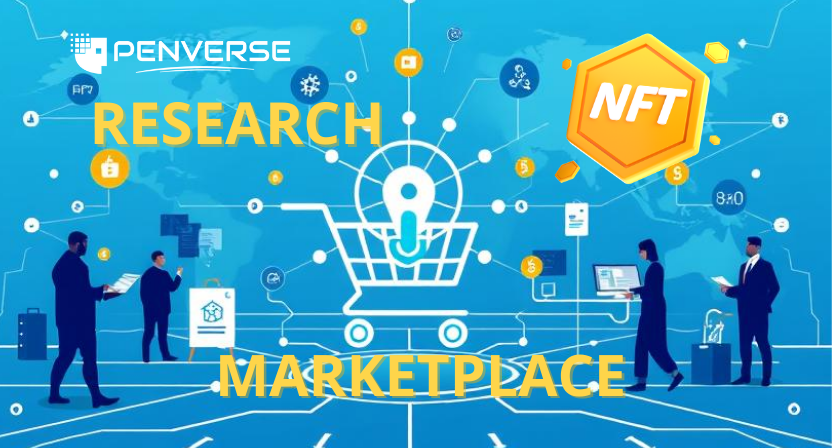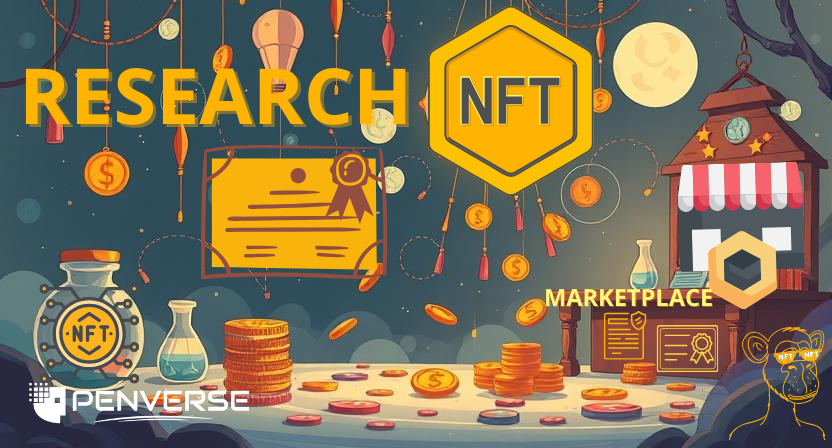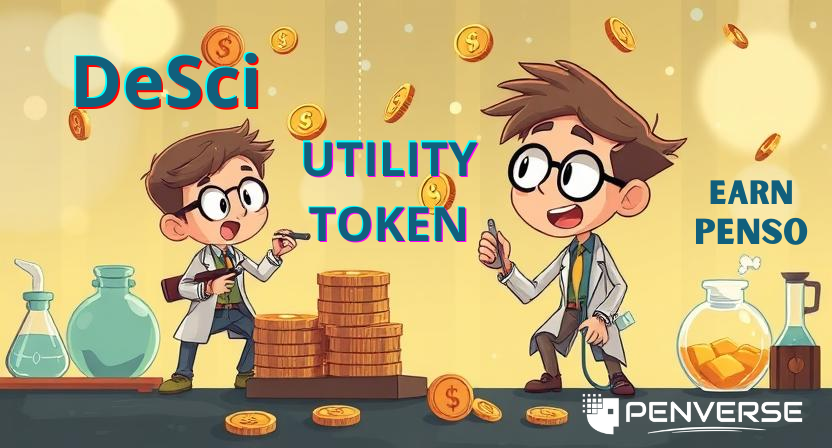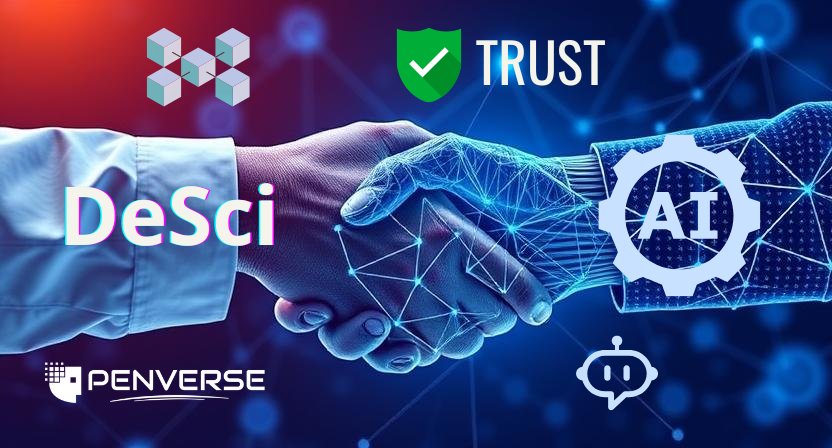From Idea to Innovation—DeSci & AI Fast-Track Breakthroughs!
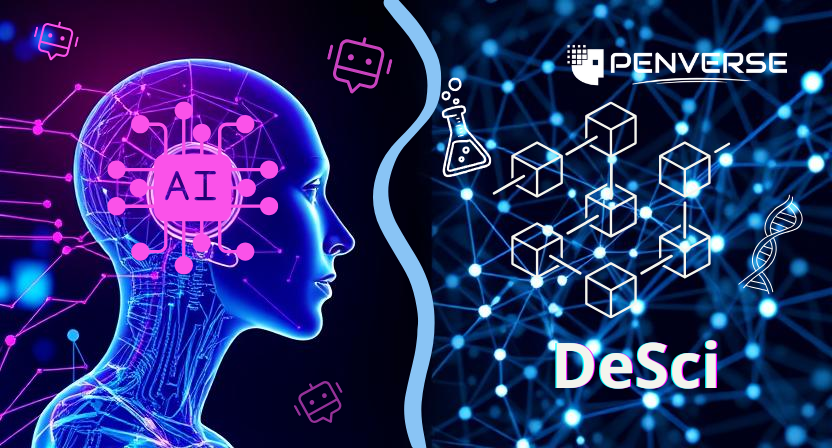
The Journey from Idea to Innovation
Scientific innovation begins with an idea—an unanswered question, a new hypothesis, or a potential breakthrough. However, turning an idea into a real-world innovation is often slow, expensive, and constrained by traditional research systems. Bureaucratic funding processes, slow peer reviews, and limited collaboration opportunities prevent groundbreaking discoveries from reaching the public.
Decentralized Science (DeSci) combined with Artificial Intelligence (AI) is revolutionizing this process. By removing traditional barriers, automating research workflows, and improving funding distribution, DeSci and AI accelerate every stage of scientific innovation, enabling researchers to move from idea to breakthrough faster than ever before.

Let’s explore how DeSci and AI streamline scientific progress and how Penverse is leading this transformation.
How DeSci & AI Fast-Track the Research & Innovation Pipeline
Artificial Intelligence is already transforming the way research is conducted across various fields. Studies show that AI-driven literature review tools can reduce research time by up to 70%, allowing scientists to focus on experimentation rather than data gathering. AI-assisted simulations in materials science have cut experimental costs by 50%, while AI-powered funding allocation models have improved research grant distribution efficiency by 40%. These advancements demonstrate how AI is not just enhancing research but fundamentally reshaping the way discoveries are made and applied in the real world.
1. Ideation & Hypothesis Generation
AI is already helping scientists generate novel hypotheses by identifying patterns in existing research. For example, IBM Watson's AI has successfully proposed new research questions in drug discovery by analyzing millions of scientific papers. AI-driven literature review platforms like Semantic Scholar and Elicit assist researchers in pinpointing gaps in knowledge, enabling them to refine their hypotheses more efficiently.
Every scientific breakthrough starts with an idea, but refining that idea into a testable hypothesis requires extensive research and validation. Traditionally, researchers must sift through thousands of papers to ensure their hypothesis is unique and supported by prior findings.
How AI Helps: AI-powered literature review tools scan vast databases, extracting relevant studies and identifying research gaps in a fraction of the time. AI can even suggest new research directions by analyzing past discoveries and emerging trends.

2. Funding & Grant Allocation
AI-driven grant allocation is already proving its value. Organizations like the Chan Zuckerberg Initiative use AI to analyze funding proposals, improving transparency and efficiency. Studies show that AI-assisted funding models have reduced application processing times by 50%, ensuring that high-impact research receives financial support faster.
Securing research funding is often one of the biggest obstacles to scientific progress. Traditional grant applications take months or years, with funding biased toward established institutions rather than the most promising ideas.
How AI Helps: AI-powered funding models evaluate research proposals based on scientific merit, feasibility, and innovation potential, automating funding decisions and reducing bias.

3. Experimentation & Data Analysis
AI is streamlining experimentation across industries. In materials science, DeepMind’s AI has predicted the structures of over 200 million new materials, accelerating innovation. In pharmaceuticals, AI models like AlphaFold have transformed protein structure prediction, cutting years off the drug discovery process. Such AI-driven experimentation reduces costs and increases accuracy in scientific research.
Once funding is secured, researchers conduct experiments and collect data. This stage can be slow, especially for complex simulations or data-heavy projects.
How AI Helps: AI automates experimental design, runs simulations, and processes massive datasets in real time. In fields like drug discovery, climate science, and material engineering, AI-driven models predict outcomes before real-world testing, saving time and resources.

4. Peer Review & Validation
Traditional peer review is slow and prone to bias, but AI is changing that. Journals like PLOS ONE and Springer Nature are experimenting with AI-powered screening tools to detect errors, plagiarism, and low-quality studies. AI has been shown to increase the accuracy of peer review assessments by 60%, reducing the time needed for approvals and improving the overall reliability of published research.
The peer review process ensures research integrity, but traditional peer review is slow, prone to bias, and lacks transparency.
How AI Helps: AI automates peer review by scanning for plagiarism, statistical errors, and methodological inconsistencies. AI can also verify reproducibility by running simulations of reported findings.

5. Publishing & Knowledge Distribution
AI is playing a crucial role in breaking down barriers to research access. Tools like OpenAI’s GPT models help generate lay summaries of complex studies, making them more accessible. AI-powered platforms like arXiv and ResearchGate are using smart indexing to ensure that scientists can quickly find relevant research, eliminating the inefficiencies of traditional publishing models.
Scientific research should be freely accessible, yet paywalls and institutional barriers prevent many discoveries from reaching a global audience.
How AI Helps: AI-driven open-access platforms help categorize and disseminate research, ensuring findings are visible to the right audiences. AI can also translate and summarize papers, making research more accessible.

6. Commercialization & Real-World Impact
AI is accelerating the transition from research to real-world applications. Startups are using AI to scan patents and scientific papers, identifying opportunities for commercialization. AI-driven tools have also helped startups secure investments by matching research findings with market needs. In biotech, AI-driven discovery processes have led to multiple FDA-approved drugs in record time, proving the value of AI in turning research into innovation.
Transforming research into usable innovation requires collaboration with industries, policymakers, and startups. However, many great discoveries never make it past the academic world due to funding and commercialization barriers.
How AI Helps: AI identifies market opportunities, matches research with potential investors, and predicts real-world applications of discoveries.

How Penverse Supports AI-Powered DeSci Research
Penverse integrates AI into every stage of the research lifecycle, ensuring a seamless transition from idea to innovation. Here’s how Penverse enhances DeSci:
| Research Stage | How Penverse Helps |
|---|---|
| Ideation & Hypothesis Generation | AI Research Assistants provide instant literature reviews and citation tracking. Blockchain-secured knowledge sharing ensures transparency and proper credit for innovative ideas. |
| Funding & Grant Allocation | Decentralized Autonomous Organization (DAO) governance allows global communities to vote on funding distribution. AI-driven grant evaluation ensures fair and strategic funding allocations based on impact-driven metrics. |
| Experimentation & Data Analysis | AI-assisted experiment design optimizes research protocols. Smart contracts ensure research milestones are met before funding is released. Decentralized research collaboration allows for real-time data sharing among global scientists. |
| Peer Review & Validation | AI-powered decentralized peer review reduces bias and speeds up validation. Blockchain-verified research records ensure findings cannot be altered post-publication. Smart contracts reward peer reviewers for contributing to scientific integrity. |
| Publishing & Knowledge Distribution | Decentralized publishing removes paywalls and allows open knowledge sharing. AI-curated research discovery tools help scientists find relevant studies. Tokenized rewards encourage contributors to share and validate findings. |
| Commercialization & Real-World Impact | DeSci marketplace connects researchers with industry partners. AI-powered innovation matching helps bridge the gap between academia and commercialization. Tokenized incentives ensure long-term sustainability of research projects. |
The Future of Innovation with AI & DeSci
The combination of AI and DeSci is accelerating the entire scientific process, removing inefficiencies and making research more open, accessible, and impactful. By integrating AI-driven research agents, decentralized funding, and blockchain-backed validation, Penverse ensures that great ideas don’t just remain ideas—they become groundbreaking innovations.

🚀 Join the AI-powered DeSci revolution with Penverse today! 🚀

